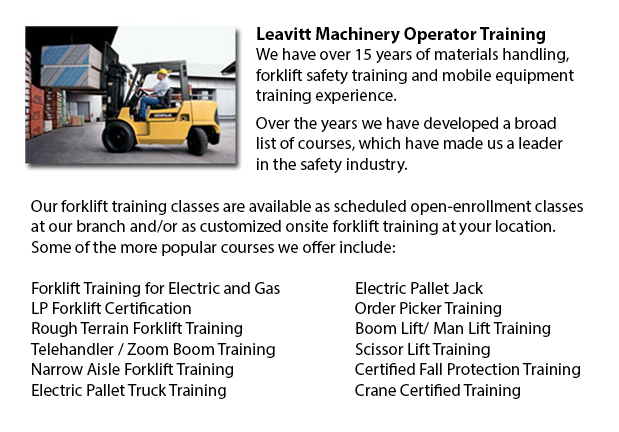
Kitchener Forklift Certification Schools - In North America, forklift certification is mandatory, making forklift training programs essential for both the business and their workers working as forklift operators. Forklift training focuses on safety and health issues involved in forklift operation. Safety issues affect both the forklift driver and employees and other people who are in close proximity to the forklift. Businesses might be subject to penalties if they are caught with operators who are not certified during an inspection. There are a lot of convincing reasons why businesses should abide by forklift standards.
The majority of federal, state, and provincial regulations require a worker evaluation of the skills needed for forklift safety before the employer signs off that the worker is certified. There are several ways to get forklift training for workers, like online forklift training. Nonetheless, employers have to know that forklift certification training is not "just a test". Right forklift training should consist of several fields of study, like for instance theory and hands-on practice. Rules do not need employers to have an outside organization to certify operators of forklifts.
The recommended program for a quality forklift certification service includes both classroom training and an on-site component. Classroom training usually features informative sessions with videos, power point presentations, discussions and models. Students typically are needed to write a test to check for comprehension of subject matter. Certificates of completion are given upon successful completion of the class.
An evaluation of the student's use of the equipment includes knowledge of job site hazards, pre-operational equipment inspection, a pass/fail operational test and operational instruction.
Training usually consists of the following subject areas: Controls & Instrumentations; Understanding regulations and legislations; Engine Operation and Maintenance; maneuvering and Steering; Fork and Attachment Limitations, Visibility; Rated Capacities, Stability, Inspection & Maintenance; Load Control; Refueling; Pedestrians, and Hazardous Locations & Rough Terrain Operation. There are also training courses offered for workers who are transitioning to new job positions.
-
Kitchener Forklift Training Schools
Kitchener Forklift Training Schools - The Advantages Of Taking One Of Our Forklift Training Schools Are you searching for work as a driver of a forklift? Our regulatory-compliant mobile equipment operator training offers instruction in types of fo... More -
Kitchener Overhead Crane Operator Training
Kitchener Overhead Crane Operator Training - Our overhead crane operator training course is designed to teach employees the basics of overhead crane/sling operation and pre-shift checks. Courses are taught by our expert trainers and consultants. Well... More -
Kitchener Crane Training School
Kitchener Crane Training School - The crane training school offers industry-relevant programs. Courses provide trainees with learning outcomes which match present industry demands. Our small class sizes combine hands-on experience and theory. Our qua... More -
Kitchener Skid Steer Ticket
Kitchener Skid Steer Ticket - The lift arms on the skid-steer loader are located at the side of the driver along with pivots behind the driver's shoulders. These features makes the skid-steer loader different as opposed to the conventional front load... More -
Kitchener Manlift Operator Certification
Kitchener Manlift Operator Certification - Our scissor platform and aerial lift training and certification empowers participants with a knowledge and general understanding of the efficient and safe use of "Power Operated Mobile Work Platforms," under... More -
Kitchener Crane Safety Training
Kitchener Crane Safety Training - Companies and crane operators have to be aware of the problems related to crane safety. Legislation provides rules for the safe operation, inspection and maintenance of lifting machines all around North America. Cran... More -
Kitchener Forklift Training Programs
Kitchener Forklift Training Programs - Are you searching for work as a forklift driver? Our regulatory-compliant mobile equipment operator training offers instruction in kinds of forklifts, pre-shift check, fuel kinds and dealing with fuels, and safe... More -
Telehandler Training in Kitchener
Telescopic handlers often known as telehandlers for short, are an extremely popular piece of heavy construction machinery. They are commonly used in the construction and agricultural industries. These equipments have extreme reaching ability and can... More

Forklift Certification Kitchener
TOLL FREE: 1-888-254-6157
Kitchener, Ontario
forkliftcertificationkitchener.com
Email Us
About Us


